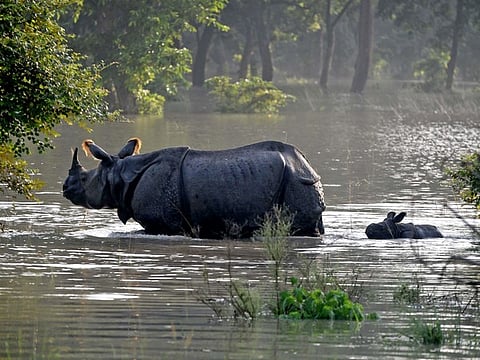

NEW DELHI: The Uttar Pradesh forest department has released two greater one-horned rhinos into the Dudhwa Tiger Reserve (DTR) as part of the country's oldest Rhino Translocation project.
Launched in 1984, the Rhino Translocation project aims to revive the critically low rhino populations in India. Rhinos have been sourced from Assam's Kaziranga National Park and introduced into suitable habitats, particularly in the Terai region of the Himalayan foothills.
According to the Uttar Pradesh Forest Department, a male and a female rhino, both aged between 15 and 20 years, were released following a detailed assessment of their behaviors, health, and ability to adapt to living freely in the forest over the past few years.
Earlier, a specialised team of rhino experts tranquilised the rhinos and later moved and released them after checking their health parameters.
The State’s Forest Department already released two rhinos in the DTR in November 2024 in a similar operation.
According to conservationists, rhinos had a sizeable population in the Terai region of the Himalayan foothills until the end of the 19th century. However, rampant poaching and habitat shrinking led to their extinction in the region. They are now concentrated in Assam’s Kaziranga areas.
Later, in 1984, with the support of the Government of India, the UP government planned to introduce the Rhinos Translocation plan.
The forest department created 27 sq km of enclosures, where 46 rhinos have been kept under watch in the past four decades inside DTR.
Released rhinos are being consistently tracked with the support of the camp elephants and their trained mahouts.
A Delhi-based wildlife conservation organisation, WWF-India, provided technical support to the forest department in conducting the historic rhino translocation exercises at DTR.
“The successful relocation of rhinos at Dudhwa Tiger Reserve is a giant leap for rhino conservation," said Anuradha Vemuri, PCCF (WL) & Chief Wildlife Warden, Uttar Pradesh Forest Department.
Vemuri appreciated the forest department’s four decades effort in bringing the rhinos back to the landscape. “The learnings from the first translocation and their promising results have helped translocate a second lot of rhinos,” he added.
Dr Dipankar Ghose, Senior Director of Biodiversity Conservation at WWF-India, underlined rhinos' important roles in forests. “A stable population of free-ranging rhinos benefits the larger Terai landscape, one of the country's best production landscapes,” said Ghose.
“Rhinos also spread seeds through their dung, which enriches their soil and helps plants flourish. They are indicators of grassland ecosystems,” he adds.